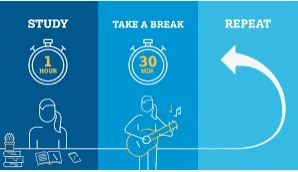Studying can be tiring, especially when you are studying slow-paced courses that require a lot of thinking and reading.
Taking breaks during your study is good for your mind and helps improve your performance. Breaks are now considered a part of the study process in many universities worldwide.
How do you know when to take breaks? How often should you take a break while studying? This blog post is dedicated to answering these questions.
How Often Should You Take Breaks when Studying
The best way to get your work done is to take breaks. You can take a break between each assignment or take a longer break in the middle of the day.

The first type of break is called a “caffeine break, “which allows your brain to get rid of its caffeine levels. This type of break is good for people who are studying for exams because their brain needs a little extra boost.
The second type of break is called a “physical break, “allowing your body to rest and recharge itself.
This break is good for anyone who doesn’t want to be studying all day long because it will help them focus better on their work.
When studying, taking regular breaks should not be negotiable. Go for a walk, have a snack, or simply step away from your books and close your eyes for a few minutes.
When you are through with one section of your work and feel like getting back to it, you’re in the middle of a break. You should reward yourself by taking a break from studying whenever necessary.
In addition to taking regular breaks, it’s helpful to schedule them into your day. If possible, set aside specific times each day for studying. Such will help you avoid getting behind on work because there are no breaks between assignments.
Importance of Taking Breaks While Studying
1. Refreshes Memory
While studying, you can learn more if you take breaks. Breaks can help your brain stay active and alert. If you are studying for an exam and your mind is tired, you will not be able to concentrate on the subject matter.

You can take short breaks for a few minutes or longer, such as a walk around the block or taking a break from your computer to eat lunch or dinner.
Taking these types of breaks is crucial because it helps improve memory retention and overall performance in schoolwork, especially in high-level classes like college-level courses or graduate programs at universities.
2. Burnout Prevention
Regular breaks will also help prevent burnout from becoming a problem for you during those difficult times when you are studying for an important test or other important assignments that require long hours at the library or in front of the computer screen.
Burnout is common among students who do not get enough sleep and do not take any breaks during their studies. That is because they believe they have to continue working on their work until it’s finished.
No matter how much time had passed since they started working on it earlier in the day or evening hours when they were not feeling well but knew they had some serious.
3. Relieves Stress
You will get more productive in the long run if you take breaks from work every half an hour or so. The longer you study, the more tired you will become, so you must take breaks so your memory does not get affected.

Taking breaks helps prevent stress from building up in your body; this can affect your performance at work or school, resulting in poor grades or even failing exams!
4. Improves Productivity
Taking breaks is an important way to improve your productivity. If you are taking breaks and working simultaneously, you are likely not getting the most out of your time. Take a break from studying to have a fresh mind and achieve more.
It is important to take breaks while studying because it will help ensure you are not getting too tired or stressed out.
You should also avoid staying too long in one place without changing positions or doing something else to keep yourself entertained. This can cause stress due to boredom, which will only worsen your body.
Taking breaks while studying is important to being productive and helping your overall health and wellbeing.
How to Take Breaks While Studying
Here are some tips on how often to take a break when studying:
Make Sure You Get Enough Sleep
Sleeping helps your body recharge to have more energy and fuel for the next day of studying or work.

If you do not get enough sleep or stay up too late, your brain doesn’t function as well during the day, and it becomes harder for your brain to think clearly and focus on what needs to be done.
Sleep deprivation can make it harder for your brain to recall information from previous days or weeks of studying because your memory is not as strong from lack of restful sleep over time!
Take a Break Every Hour or Two
If possible, schedule your breaks around your study sessions, so they don’t interfere with them. For example, if you have a two-hour lecture session and then an hour break, try to ensure the break isn’t right after the lecture period and before it begins for optimal results!
Don’t Fall Asleep During your Break
It is fine to close your eyes for a few minutes but don’t fall asleep unless there is no one else around, in which case, consider using headphones so no one can hear.
Don’t get distracted! Once again, ensure your surroundings are quiet before taking a break so no one can hear anything happening around you.
What to do During the Study Break
Go on a trip with friends or family
It’s a great way to get out of the house and see something new. If your parents don’t let you go without them, try calling a friend who is more lenient.
Go to the movies

This is especially good if you want to see one that is rated “R” or higher, which stands for “restricted minors” (18+). You can also watch videos online if they are available at your local library or video store.
Group Discussion
Do homework with someone else in your household or with other people from school. It’s fun! You can even make up some topic and discuss other issues that do not related to studies.
For that matter, pick up an interesting issue and exhaust it. For instance, if it is a social development plan, look for ways to get it completed.
Play
Go outside and play sports or go for a walk in nature. It will make you feel better about missing class for a day or two!
Rest
You need to rest so your brain can process everything before you start studying again.
You mustn’t overdo it, though, as this can cause symptoms such as headache and fatigue, hindering your concentration when it comes time to study again.
Eat Well
Eating well is also important during the study break as it helps in digestion and absorption of vitamins and minerals in food.
You should ensure that you’re eating enough fruits and vegetables and protein-rich foods such as meat, fish or eggs.
Sleep Well
The last thing that we recommend is getting enough sleep during the study break. This sleeping helps your body to recover from all those late nights spent studying and partying with friends.

